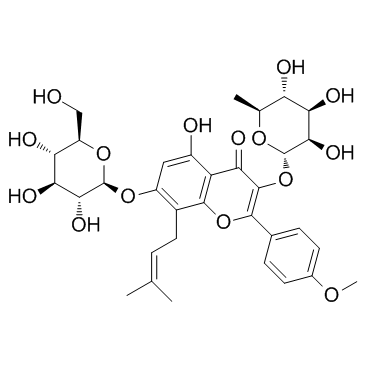Impaired hypothalamic insulin signaling in CUMS rats: restored by icariin and fluoxetine through inhibiting CRF system.
Ying Pan, Ye Hong, Qing-Yu Zhang, Ling-Dong Kong
Index: Psychoneuroendocrinology 38(1) , 122-34, (2013)
Full Text: HTML
Abstract
Epidemiological evidence demonstrates the neuroendocrine link between stress, depression and diabetes. This study observed glucose intolerance of rats exposed to chronic unpredictable mild stress (CUMS) in oral glucose tolerance test (OGTT). CUMS procedure significantly up-regulated corticotropin-releasing factor (CRF)-related peptide urocortin 2 expression and elevated cAMP production, resulting in over-expression of suppressor of cytokine signaling 3 (SOCS3) in hypothalamic arcuate nucleus (ARC) of rats. Furthermore, SOCS3 activation blocked insulin signaling pathway through the suppression of insulin receptor substrate 2 (IRS2) phosphotyrosine and phosphatidylinositol-3-kinase (PI3-K) activation in hypothalamic ARC of CUMS rats after high-level of insulin stimulation. These data indicated that CUMS procedure induced the hyperactivity of CRF system, and subsequently produced conditional loss of insulin signaling in hypothalamic ARC of rats. More importantly, icariin and fluoxetine with the ability to restrain CRF system hyperactivity improved insulin signaling in hypothalamic ARC of CUMS rats, which were consistent with the enhancement of glucose tolerance in OGTT, showing anti-diabetic efficacy. Although effective in OGTT, anti-diabetic drug pioglitazone failed to restore hypothalamic ARC CRF system hyperactivity, paralleling with its inability to ameliorate the loss of insulin signaling and depression-like behavior in CUMS rats. These observations support the hypothesis that signal cross-talk between hypothalamic CRF system and insulin may be impaired in depression with glucose intolerance and suggest that icarrin and fluoxetine aiming at CRF system may have great potential in the prevention and treatment of depression with comorbid diabetes.Copyright © 2012 Elsevier Ltd. All rights reserved.
Related Compounds
| Structure | Name/CAS No. | Molecular Formula | Articles |
|---|---|---|---|
 |
Icariin
CAS:489-32-7 |
C33H40O15 |
|
Icariin promotes histone acetylation and attenuates post-str...
2013-04-16 [Neuroscience 236 , 281-8, (2013)] |
|
High-performance liquid chromatography-based multivariate an...
2012-01-01 [Biosci. Biotechnol. Biochem. 76(5) , 923-7, (2012)] |
|
Inhibitory effect of icariin on Ti-induced inflammatory oste...
2014-12-01 [J. Surg. Res. 192(2) , 447-53, (2014)] |
|
The beneficial effect of Icariin on bone is diminished in os...
2012-07-01 [Bone 51(1) , 85-92, (2012)] |
|
Icariin: a potential promoting compound for cartilage tissue...
2012-12-01 [Osteoarthr. Cartil. 20(12) , 1647-56, (2012)] |